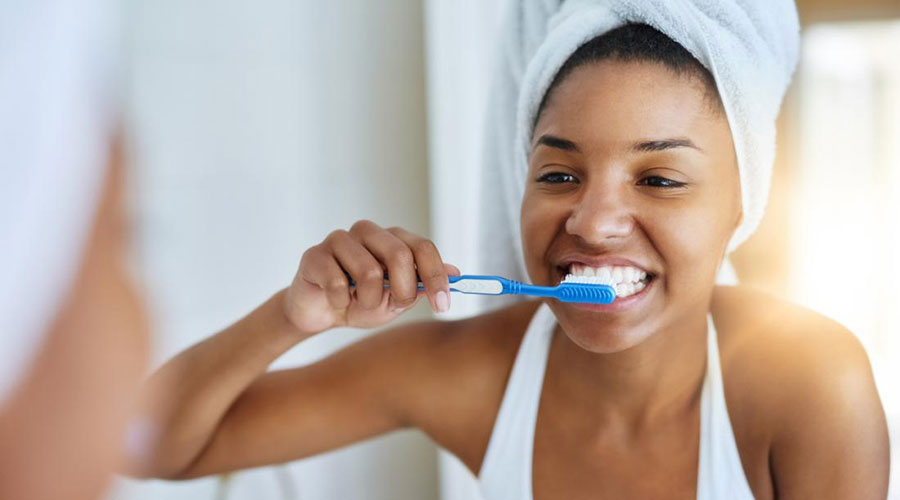

Tooth sensitivity is one of the issues that make chewing food a bit difficult.
Dr AbduKadir Mamataliev, a dentist at Deva Medical Center, Nyarutarama, says that anyone who experiences tooth sensitivity, evades daily activities like consuming hot or cold foods and beverages as well as brushing their teeth.
These simple activities cause tooth sensitivity sufferers to live in constant fear of severe pain. Sensitivity occurs when the dentin, a permeable tissue in the teeth, becomes exposed. The dentin has microscopic channels, called tubules, which are pathways to the nerve, he states.
Mamataliev warns that when dentinal tubules are bare, due to ebbing gum tissue or enamel loss, nerves are more easily triggered by certain stimuli, hence, causing tooth sensitivity.
Dr Roger Anamali, a dental surgeon at Baho International Hospital Nyarutarama, notes that dentin hypersensitivity or sensitive teeth affects one in four adults. It can cause severe pain and daily discomfort.
He says, having sensitive teeth can make it hard for you to enjoy some of your favourite hot or cold foods. Most of the time, the teeth become more sensitive because the gums start to shrink. As loosening occurs, the roots of the teeth are exposed. When these roots come into contact with liquid, air or hot or cold food, discomfort or temporary pain is felt.
Mamataliev says that tooth sensitivity is among the common causes of a toothache. Tooth sensitivity refers to tooth discomfort or feelings of toothache in one or more teeth. The pain of tooth sensitivity is usually shrill, abrupt and shooting. Tooth sensitivity occurs when the layer of a tooth underneath the enamel (called the dentin) or the layer covering the root (called cementum) is exposed along the gum line due to receding gums. The exposed areas respond to hot and cold, and sometimes to sweet and spicy foods, and provoke pain.
He says, some factors that can lead to tooth sensitivity may include vigorous brushing. This is basically brushing of the teeth with too much force, or with a hard-bristle toothbrush. It may wear down tooth enamel, reveal the cementum or dentin and cause tooth sensitivity.
Mamataliev adds that grinding of the teeth can cause the enamel to erode and leave the dentin exposed.
WHY DENTAL EXPOSURE
"The gums and enamel protect the porous part of the tooth. The main causes of dentine exposure could be due to poor dental hygiene. For example, the plaque that forms around the gums hardens to turn into tartar which contains a bacteria causing gingival recession.
"Bad brushing is also another imperative cause. It is estimated that about 50 per cent to 90 per cent of people press their toothbrush too hard when brushing. In the long run, the gum loosens,” Anamali says.
He further notes that abrasion of teeth caused by the use of a toothbrush with stiff bristles, surgery following periodontal infection, enamel erosion instigated by chemical agents, interdental problems, trauma to the gum, medical conditions like chemotherapy, bulimia, and radiotherapy, and compressing or gnashing of teeth, are all causes of dental exposure.
THE BASIS OF TOOTH SENSITIVITY
For Mamataliev, temporary tooth sensitivity can occur after a professional teeth-whitening treatment, but usually, goes away shortly after the procedure ends.
Tooth sensitivity comes after filling. Someone may experience tooth sensitivity after having a cavity filled or a filling replaced, the tooth decay that causes cavities irritates the tooth, and the filling procedure, while necessary, can lead to further sensitivity, he adds.
He says that tooth sensitivity after a filling would recover on its own within a few weeks. It may last longer, as long as a few months, but as long as the tooth sensitivity shows steady progress, there should be nothing to worry about. Persistent tooth sensitivity, however, may indicate that a root canal is needed.
Mamataliev also says that sometimes after a filling, teeth become sensitive when biting down. However, this can be fixed with a simple bite adjustment. Moreover, the filling may be too high, in this case, the dentist could lower the filling.
He also explains that composite fillings may cause tooth sensitivity when chewing. There is no pain when the teeth are clenched together, however, tooth sensitivity is usually fixed by regulating the bite or replacing the filling with another composite.
TIPS FOR SAFE, HEALTHY TEETH
"Make an appointment with your dentist in case of tooth sensitivity. Dentists usually check for possible problems like cavities, loose fillings, or sunken gums that could be causing the sensitivity.
"The dentist can also clean your teeth and do a visual exam. They may touch your teeth using dental instruments to check for sensitivity, or also order an X-ray on your teeth to rule out causes like cavities,” Mamataliev says.
He says that there are numerous brands of toothpaste for sensitive teeth available. Dentists may approve one or you may have to try different brands until you find the product that works for you. Make it a point to use fluoridated toothpaste for sensitive teeth, not tartar-control toothpaste. But also, spread a thin layer of the anaesthetic toothpaste on the exposed tooth roots before bed.
He adds that it is essential to use a soft-bristled toothbrush, avoid highly acidic foods, use a fluoridated mouthwash daily, avoid teeth grinding and consider getting a mouth guard.
Anamali encourages brushing of the teeth gently two to three minutes a day to remove the plaque that forms on the teeth; use an electric toothbrush designed to reduce scratching; floss daily to clean the 40 per cent of the tooth surface that cannot be reached with the toothbrush.
Have a dental exam every six months, or as recommended by your dentist and eat a balanced diet and favour an abundance of vegetables. Reduce your intake of high-sugar foods to reduce the risk of tooth decay and most importantly, practice good oral hygiene, he adds.


